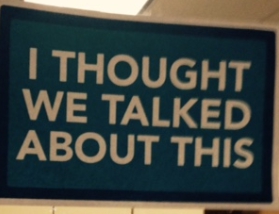
Coming Up Next…
June 30, 2015
Seattle: Culture Change Leader
August 11, 2015CULTURE CHANGE CAN HAPPEN AT ANY LEVEL OF AN ORGANIZATION
Last week I had the opportunity to speak to a group of 100 individuals who manage the ticket sales for major university athletic departments across the country. It was one of the first times I was giving a speech, not facilitating a small group discussion. I was given a one hour time slot but was positioned at 11 am – I was the only thing between them and lunch. My topic, of course, was How to Build an “All-In” Culture.
I started the conversation by asking 3 questions:
1] How important is an organization’s culture to the group’s output?
2] How important is an Organizational culture to their personal well-being?
3] Were the working in a culture they liked?
For the first 2 questions everyone raised their hands, but on the 3rd question only a small number of hands were raised. The ticket business is a very difficult business – in most cases, demand for tickets is determined by the whether the University’s athletic teams are winning or not. There has also been a large increase in exposure on TV, which has changed the traditional game day experience dramatically. Games are now more associated with a television schedule than with fans in the stadium. All said, the ticket operations staff are feeling a lot of pressure – to not only be very good at processing the tickets they sell, but also they now have the added responsibly to re-sell or re-capture past ticket buyers who have decided to watch the games on TV.
As I started working my way through the concepts of how you build Trust and Respect, building the baseline of outstanding cultures, I was struck that I have always viewed this as a process that needed to be supported by the senior management of an organization. Changing an organization’s culture requires that the senior group is driving this process, yet here I was talking to the managers in the middle of the organization – who are not going to see or feel this type of change driven by their athletic department’s leadership. About 2/3 of the way through detailing the 8-10 behaviors that build positive trust and respect, I found myself wondering if my impassioned pitch was just a pipe dream or if a manager or even a non-manager could use these Behavior concepts to create their own personal cultures – and if they demonstrated these behaviors, how this might create a cultural change that did not need to be driven from the top of the organization.
As I reached the close of the presentation, I had this very clear understanding: an individual can create their own culture by simply following the basics of the behavioral skills approach.
* If you listen with the intent to understand and use paraphrasing and great questions as your way of actually listening to another team member, you will develop the reputation of being a great listener – People will want to talk to you.
* If you are the person in the meeting who clarifies the problem before everyone argues about the solutions – People will want you to be in the meetings because you are impacting the outcome and helping to focus the meeting.
* If you always do an Initiative document that addresses the 5 “W’S” and the How, and you always have the “Who”s sign off on the initiative – You will be the one that gets projects done, with less argument and more ownership.
* If you manage conflicts in a skillful manner – You will be the one who other people want in the room when conflict arises.
* If you are the person who works very hard at expressing clear expectations, both for yourself as well as for others – You will be the person that others will want to partner with on projects.
* If you regularly [at least once per year] pull out you job description and make sure your tasks on the description actually match what you do, and you make sure that your boss agrees with your changes – You will be the one in control of your position and your boss will be aware of your discipline and attention to doing a good job.
By following the behavioral principles in the “All-IN” culture, you can gain control of your position, and you will find that other people that you work with will start following your leadership.
Culture change happens when people’s behaviors change – attitude follows the behaviors, and people want to trust and respect individuals who are skilled at behaving in an “ALL-IN” manner.





